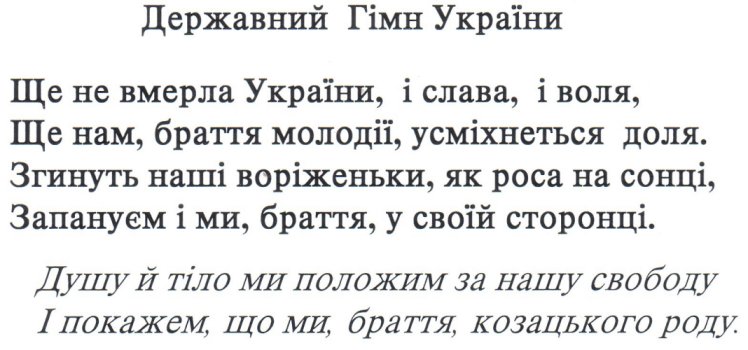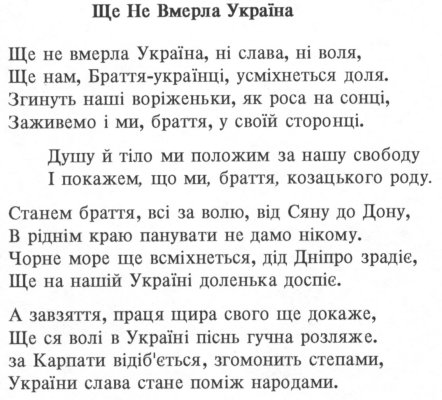
In 1992 the Ukrainian Parliament chose as the national anthem music composed in 1863 by Mykhailo Verbytsky, a western Ukrainian composer and Catholic priest. Verbytsky originally wrote the score as a solo song and later for orchestra to accompany a patriotic poem written in 1862 by Pavlo Chubynsky, a prominent ethnographer in the Kyiv region. In his poem Shche Ne Vmerla Ukrayina (which means "Ukraine is not yet dead"), Chubynsky expressed the mixture of hope and desperation felt by Ukrainians over their continuous struggle to rule their own land. Widely sung around the country as the "Hymn to Ukraine," both the melody and lyrics were similar to those of Polish and Serbian anthems. In 1917 it became the anthem of the short-lived Ukrainian National Republic, but during the Soviet era it was replaced.
Over time there were various changes and additions to Chubynsky's original words, resulting in several slightly differing versions of the Hymn to Ukraine. Following independence in 1991, many Ukrainians were disatisfied with the pessimistic tone, so the Ukrainian government made the Verbytsky score official but hesitated to approve the Chubynsky's lyrics. A comission sponsored contests for replacement lyrics, but none were decided on. Agreement finally came in 2003, when the Parliament passed and the President signed an act recognizing a slight change to the version of Chubynsky's lyrics that were usually sung. Only the first stanza and the refrain (which is sung twice) were approved in President Kuchma's official proclamation.

Ukraine's glory hasn't perished, nor her freedom
Upon us, fellow compatriots, fate shall smile once more.
Our enemies will vanish, like dew in the morning sun,
And we too shall rule, brothers, in a free land of our own.
We'll lay down our souls and bodies to attain our freedom,
And we'll show that we, brothers, are of the Kozak nation.
....translated by Ihor W. Slabicky (Copyright 2003 by Ihor Slabicky)
The most important change was made to the first line, where the case ending of the word "Ukraine" was changed, so that rather than saying "Ukraine hasn't yet died, nor has her glory or freedom," it now says that it's Ukraine's glory and freedom which haven't perished. The second line replaces the words "brother Ukrainians" with the words "young brothers." This was a rarely sung variation of the Chubynsky lyrics.
Translator Slabicky suggests "fellow compatriots" as a suitable translation for the phrase "brattya molodiyi" or literally "young brothers" because the phrase dates back to Kozak days and refers to the Kozak (Cossack) brotherhood with all its desired qualities, including the strength and vigor of youth.
The change may have been influenced by political correctness, that is, not wanting to imply that all citizens of Ukraine are of Ukrainian descent. Apparently the concept of Kozak brotherhood is so ingrained in Ukrainian culture that the repetition of the word brother (three times in the Ukrainian lyrics) is not a sytactic problem and the lack of reference to "sisters" or "sisterhood" is not a feminist issue, at least to the politicians who approved of the new lyrics.
Here's an earlier version of the lyrics, with several stanzas, that was circulating before the official pronouncement. It was brought to the U.S. from Kharkiv in 1993.

Ukraine has not perished, neither her glory, nor freedom,
Upon us, fellow-Ukrainians, fate shall smile once more.
Our enemies will vanish, like dew in the morning sun,
And we too shall dwell, brothers, in a free land of our own.
We'll lay down our souls and bodies to attain our freedom,
And we'll show that we, brothers, are of the Kozak nation.
We'll stand together for freedom, from the Sian to the Don,
We will not allow others to rule in our motherland.
The Black Sea will smile and grandfather Dnipro will rejoice,
For in our own Ukraine fortune shall flourish again.
Our persistence and our sincere toils will be rewarded,
And freedom's song will resound throughout all of Ukraine.
Echoing off the Carpathians, and rumbling across the steppes,
Ukraine's fame and glory will be known among all nations.
....translated by Ihor W. Slabicky (Copyright 2000 by Ihor Slabicky)
This material is revised from The Language and Travel Guide to Ukraine by Linda Hodges and George Chumak (Hippocrene, 2000), copyright 1994-2000 by Linda Hodges and George Chumak.